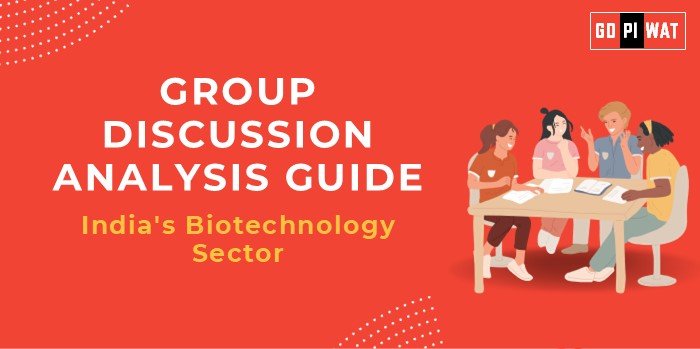📋 GD Analysis Guide: India’s Biotechnology Sector
🌐 Introduction to the Topic
- Opening Context: “India’s biotechnology sector is poised to play a pivotal role in global healthcare, agriculture, and environmental sustainability, given its expanding talent pool and innovation ecosystem.”
- Background: Since the establishment of the Department of Biotechnology in 1986, India has fostered innovation in biopharma, agri-biotech, and industrial biotechnology. With growing investments and favorable policies, India aims to become a biotechnology superpower by 2025.
📊 Quick Facts and Key Statistics
- Market Size: India’s biotechnology industry was valued at $151 billion in 2023, accounting for 4.25% of the nation’s GDP, and is projected to reach $300 billion by 2030.
- Global Ranking: India ranks among the top 12 biotechnology destinations worldwide and is the third-largest in the Asia-Pacific region.
- Startup Ecosystem: The country hosts over 8,500 biotech startups, with expectations to reach 10,000 by 2025.
- Employment: The biotech sector employs over 3.3 million individuals, contributing significantly to the economy.
🤝 Stakeholders and Their Roles
- Government: The Department of Biotechnology (DBT) and initiatives like the Biotechnology Industry Research Assistance Council (BIRAC) provide funding, infrastructure, and policy support to foster innovation and commercialization.
- Private Sector: Companies such as Biocon and the Serum Institute of India lead in biopharmaceuticals and vaccine production, driving research and development.
- Academia: Institutions like the Indian Institutes of Technology (IITs) and the National Institutes of Pharmaceutical Education and Research (NIPERs) contribute to research and talent development.
- International Collaborations: Partnerships with global organizations and countries enhance research capabilities and market access.
🏆 Achievements
- Vaccine Production: India is a leading global vaccine manufacturer, supplying 25% of WHO-purchased vaccines and exporting 20% to Africa.
- Bio-Industrial Growth: The bio-industrial sector, including biofuels and bioplastics, constitutes approximately 48% of India’s bioeconomy.
- Biopharmaceuticals: India is a major supplier of low-cost drugs and vaccines globally, leading in biosimilars with the highest number of domestic approvals.
⚠️ Challenges
- Funding and Investment: Despite growth, the sector faces challenges in securing venture capital and private investment compared to global counterparts.
- Regulatory Framework: Complex and lengthy approval processes can delay product launches and innovation.
- Infrastructure: While urban areas have advanced facilities, rural regions may lack the necessary infrastructure for biotech research and manufacturing.
- Skilled Workforce: There is a need for more industry-ready professionals in specialized biotech fields.
🌍 Global Comparisons
- United States: Leads in biotechnology with substantial R&D investment and a supportive ecosystem for startups and innovation.
- China: Rapidly advancing in biotech through significant government investment and focus on areas like gene editing and synthetic biology.
📖 Case Studies
- Biocon: Pioneered the development of affordable biosimilars, gaining approvals in global markets, including the U.S. and Europe.
- Serum Institute of India: Developed and produced the Covishield vaccine during the COVID-19 pandemic, supplying it to numerous countries worldwide.
🛠️ Structured Arguments for Discussion
- Supporting Stance: “India’s robust growth in vaccine production and biosimilars demonstrates its potential to lead the global biotechnology sector.”
- Opposing Stance: “Challenges in funding, regulatory processes, and infrastructure may hinder India’s ability to become a global biotech leader.”
- Balanced Perspective: “While India has made significant strides in biotechnology, addressing existing challenges is crucial to achieving global leadership.”
📈 Strategic Analysis of Strengths and Weaknesses
- Strengths: Large talent pool, cost-effective manufacturing, government initiatives supporting R&D.
- Weaknesses: Limited access to venture capital, complex regulatory environment, infrastructure disparities.
- Opportunities: Growing global demand for affordable healthcare solutions, potential for innovation in genomics and personalized medicine, expanding bio-agriculture.
- Threats: Intense competition from the U.S. and China, rapid technological advancements, intellectual property challenges.
🎓 Connecting with B-School Applications
- Real-World Applications: Understanding the biotech sector’s dynamics can inform strategies in healthcare management, pharmaceutical marketing, and innovation-driven entrepreneurship.
- Sample Interview Questions:
- “How can India leverage its strengths to overcome challenges in the biotechnology sector?”
- “Discuss the role of public-private partnerships in advancing India’s biotech industry.”
- “What steps can India take to improve its regulatory ecosystem for biotechnology?”
- “How does India’s cost leadership in vaccines and biosimilars give it a competitive advantage globally?”
- Insights for B-School Students: Explore interdisciplinary learning, policy impacts, and emerging biotech trends like synthetic biology, precision medicine, and genomics.


